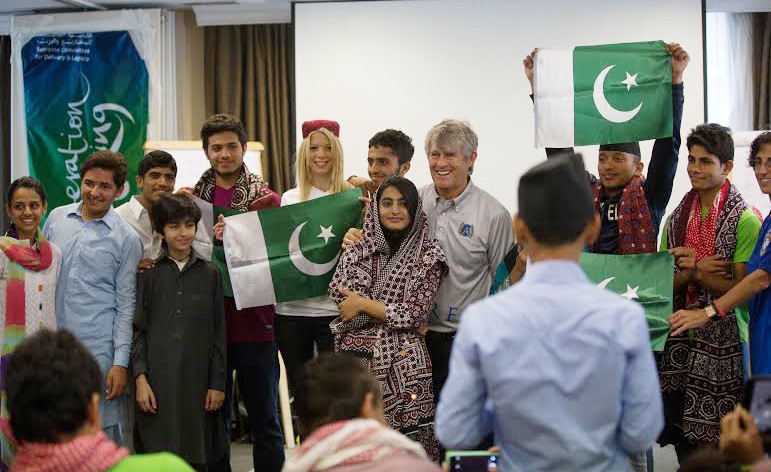
A unique initiative, Right to Play, is aimed at providing wholesome education that combines sports with education

In her early 20s, Shafaq Qureshi appears to be a girl next door. But she isn’t.
Gifted with phenomenal energy and talents, she is an unassuming change-maker in Makli. She is the head coach of the Right to Play at the Government Girls Community Primary School’s Right To Play, in Makli, Thatta.
Right To Play is an international organisation based in Canada that uses the power of sport and play to educate and empower children and youth.
Qureshi has been working hard for the last three years to innovate the process of imparting education for teachers and students alike.
Naseem Khushk, the school principal of the Government Girls Community Primary School, says Qureshi’s efforts have aroused interest among students to take interest in studies, which can be seen through improved attendance and decline in dropout rate. "These activities have helped the teachers do their job better and they don’t feel stressed anymore. That’s a lasting impact on their careers and lives," she explains.
Just an hour and half drive from Pakistan’s financial capital, Karachi, the ancient city of Thatta looks rather rundown. Unlike its glorious past, this windswept coastal town is mired in acute poverty -- and often hits the headlines for existence of polio cases.
Yet two teenagers -- Faiza Shah and Basit Ali -- are aiming to increase enrollment in school and encouraging healthy activities. They have both displayed outstanding aptitude for sports, leadership and teamwork to participate in the Generation Amazing programme, a youth development initiative implemented by Right To Play. The project aims to empower a new generation of leaders to use football to create positive change in their communities. The project included a trip to the 2014 FIFA World Cup in Brazil.
Generation Amazing is an initiative of the Supreme Committee for Delivery and Legacy of Qatar, the institution which is responsible of developing infrastructure and legacy programmes for the ground-breaking 2022 FIFA World Cup to be hosted in Qatar.
"Everything is possible to achieve, provided we start with a positive attitude and take others along with us," says Faiza Shah, the 15-year-old student of grade 9.
Like Shafaq Qureshi, Faiza Shah also has interest in promoting sports-based learning for Thatta females. She believes in a city where girls do not attend schools and men are addicted to drugs, sports are the only way out.
Her mother reluctantly consented to send her to Qatar and Brazil, where she was one among 24 ambassadors of Generation Amazing hailing from Pakistan, Qatar, Jordan and Nepal.
Basit Ali, a grade 10 student and one of a dozen siblings, thought he was probably the most unlikely participant to be selected for the programme. His father Manzoor Hussain, a peasant and gardener in Dhabeji near Thatta, learnt about Generation Amazing through acquaintances.
"I applied but nervously, thinking that there’ll be smart and rich children competing too," says Basit Ali.
He was a hardworking student and possessed leadership and teamwork abilities. "To me, victory means one’s deep conviction to win while adhering to fair play. Then you cannot be defeated by defeat." His self-belief paid off.
Since the fortnight-long training of integrating sports with life skills, he started a campaign to enroll more children in schools. "I met parents and children. I was able to convince them because I was a child myself, not an NGO or a government official," he adds.
Basit Ali is dealing with a different set of challenges, like class-based society, where feudal children are preferred in schools. "Earlier they used to ignore me due to my lower financial or social status but after I became a Generation Amazing ambassador, they consult me while planning an event or playing a sport," he explains.
Speaking about the plight of Thatta residents, Basit Ali observes that disciplined sports will impart life skills, fair play and gender equality.
Ali Khayam, chief chaperone and programme manager at Right To Play, says, "Our goal is to build a movement of coaches and youth leaders who harness the power of football to support the development of children and youth and the overall communities.??"
Right to Play is also supported by the district administration. Mushtaq Ali Khushk, the district sports officer, says the sports infrastructure was better till early 1990s, then came an era of corruption. "Now, we are in recovery phase again, with volleyball, football, table tennis and cricket being revived in schools," he claims.
Thatta city has 12 registered football clubs, while 35 at the district level. Thatta has a history of producing national and international level athletes such as Lal Kumar, Ashraf Khan, and Salman Brohi.
Right To Play is restoring playgrounds across the impoverish district.